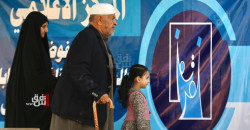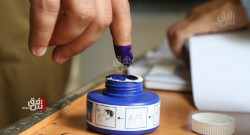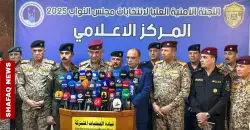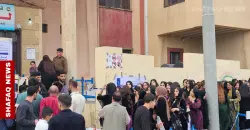Iraq's 2025 Elections: A mix of political realignment and fragile stability
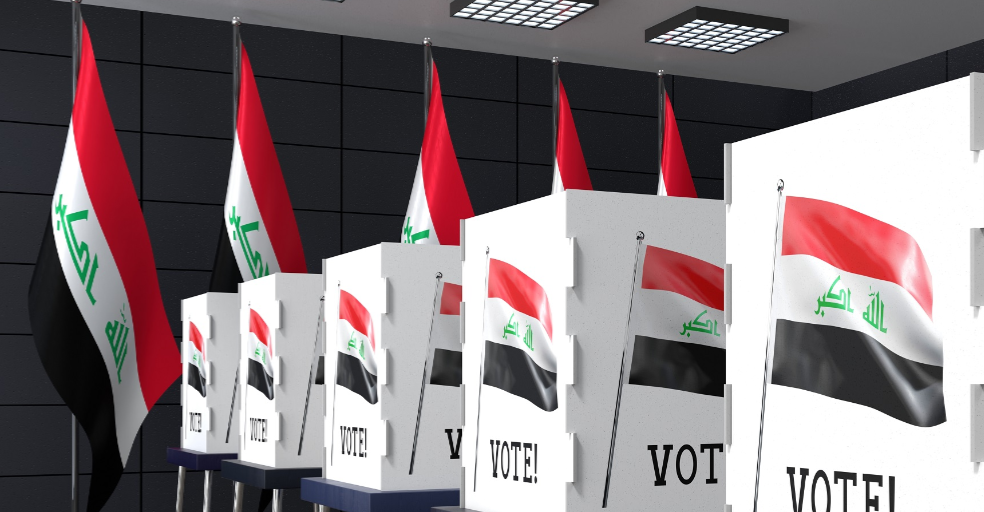
Shafaq News/ Iraq is preparing for the parliamentary elections on November 11, 2025, as the country enters a period of political reshuffling and heightened regional tension. With alliances shifting among Shiite, Sunni, and Kurdish blocs, the vote is expected to influence not only the composition of parliament but the broader balance of power in Baghdad.
Behind this unfolding political realignment lies a climate of uncertainty. As regional actors monitor the evolving dynamic between the United States and Iran, the internal scene remains unsettled. Iraqi parties are recalibrating their strategies, aware that external developments could rapidly alter domestic calculations.
Since assuming office in 2022, Prime Minister Mohammed Shia al-Sudani has presided over relative calm. Yet that stability masks a fragile arrangement, maintained by a precarious consensus among Iraq’s leading political forces.
Former Member of Parliament and State of Law Coalition figure Zuhair al-Jalabi described the current governing structure as a temporary balancing act.
“There has been a shared understanding to distribute gains and positions according to mutual agreement,” al-Jalabi noted. “But this arrangement is fragile, especially in light of Iraq’s worsening financial troubles.”
Although state institutions continue to function, the economic foundations beneath them remain shaky. Iraq’s reliance on oil revenues leaves it vulnerable to global price swings, and those vulnerabilities are being compounded by delays in implementing the national budget. Long-standing inefficiencies and poor fiscal planning persist, raising the stakes as the campaign season approaches.
Economists warn that these structural weaknesses could turn into political flashpoints. Discontent over service delivery, employment, and inflation may fuel voter frustration—and spark new rivalries within and between major political blocs. As pressure builds, competition is expected to intensify not only on the campaign trail but within corridors of power where deals are made long before ballots are cast.
In Iraq’s post-2003 political system, elections are as much about behind-the-scenes negotiations as they are about the vote itself. Coalition-building remains central to forming a government, and this year’s contest will likely hinge on how parties position themselves during both the campaign and the talks that follow.
Creating chaos
As Iraq moves toward national elections, a rising political lobby is subtly redrawing the contours of the Shiite landscape. Former lawmaker and prominent State of Law Coalition figure Zuhair al-Jalabi described the group as part of a Turkish-backed initiative that unites a Shiite faction with two Sunni blocs. Though it resembles the earlier Tripartite Alliance in form, al-Jalabi stressed to Shafaq News that “it operates through different mechanisms.”
“This lobby is maneuvering to pit al-Sudani against the Coordination Framework,” he remarked, referring to the Shiite alliance that played a pivotal role in establishing the current government. He pointed to a discreet meeting between Prime Minister Mohammed Shia al-Sudani and Syrian transitional President Ahmad al-Sharaa in Qatar, viewing it as an early indication of behind-the-scenes friction.
Despite its success in the 2023 provincial elections, where it secured 101 out of 285 council seats (After Muqtada Al-Sadr’s withdrawal), the Coordination Framework is now facing mounting internal tensions. Its electoral dominance was achieved through three distinct lists: one led by the Badr Organization and Asaib Ahl al-Haq, another by former Prime Minister Nouri al-Maliki, and a third by more centrist figures such as Ammar al-Hakim and Haidar al-Abadi.
In recent months, cracks within the alliance have become more visible. Prime Minister al-Sudani and Al-Ameri are reportedly advancing efforts to establish a broader electoral alliance from within the Framework itself. This initiative seeks to unify a diverse spectrum of Shiite forces while reaching out to Sunni and Kurdish partners—a move insiders describe as a preparatory step toward forming a cross-sectarian parliamentary majority.
However, this plan for a new electoral bloc, Tahaluf Qarar (Decision Alliance), has unraveled before its formal launch. Disagreements between al-Sudani and al-Ameri led to a decision to contest the November 11 vote on separate lists, sources said.
Al-Jalabi cast doubt on the durability of the current governing structure. “There has been a shared understanding to distribute gains and positions according to mutual agreement,” he explained. “But this arrangement is fragile, especially in light of Iraq's worsening financial troubles.”
He also disclosed that the emerging lobby—still in its formative stages—is working to build an alternative coalition capable of challenging the Coordination Framework’s dominance. Its ties with Sunni factions and its external support from Turkiye suggest a broader regional strategy at play.
Moreover, not all lawmakers interpret these developments in the same way. While al-Jalabi views them as a calculated attempt to fracture Shiite unity, others see a strategic realignment. From their perspective, the new efforts are not intended to divide the Shiite political sphere, but rather to modernize it by fostering more inclusive and diversified alliances.
Potential Revival
Sunni political figures are intensifying their efforts to restore unity and strengthen their influence after years of internal division. A series of emerging alliances reflects a coordinated attempt to reshape the Sunni political landscape and take on a more active role in steering Iraq’s future.
One of the most prominent shifts involves a partnership between the Mutahidoun Party, headed by former Parliament Speaker Osama al-Nujaifi, and the Azm Alliance, led by Muthanna al-Samarrai. The coalition is focused not only on electoral cooperation but also on addressing critical issues such as reconstruction and service provision in Sunni-majority governorates, political marginalization, and systemic neglect.
Momentum continues to build with the creation of the National Resolution Alliance, also known as Al-Hasm. This newly formed front brings together influential Sunni figures including Jamal al-Karbouli, Rafie al-Issawi, and current Defense Minister Thabet al-Abbasi. The alliance is seen as having a broader ambition to forge a unified platform capable of engaging in parliamentary negotiations and assuming a more substantial role in governance.
However, despite the growing number of strategic alignments, political cohesion remains incomplete. Mohammed Qutaiba, a member of parliament representing the Taqaddum bloc, outlined the nature of the evolving landscape in remarks to Shafaq News. Rather than viewing the developments as signs of deeper division, he framed them as the natural outcome of competing perspectives within a maturing political environment.
“These are not splits,” Qutaiba explained. “There are simply alliances that come with divergent views. Reconciling these differences is possible, but resolving the contest over leadership within the Sunni component remains complex.”
Qutaiba also pointed to the fluidity of Iraq’s political dynamics, suggesting that current alignments may shift following the election results. He anticipated new configurations that could transcend both sectarian and intra-sectarian lines. “It is very likely that Sunni and Shiite blocs will cooperate after the results. Even within the Sunni house, new alignments are possible,” he noted.
Finding Power in Unity
Efforts to bring the Kurdish political spectrum together are also on the spot, with a potential alliance between the Kurdistan Democratic Party (KDP) and the Patriotic Union of Kurdistan (PUK) capturing growing attention.
Political analyst Al-Azzawi highlights the significance of these developments, suggesting that the two dominant Kurdish parties could soon announce a joint electoral platform, reminiscent of the "Kurdistan Alliance" used back in 2009. This partnership, should it materialize, is seen as a strategic move to safeguard the Kurdish Region’s interests, particularly in light of long-standing disputes with Baghdad over critical issues such as budget allocations, oil exports, and the implementation of Article 140, which deals with the status of disputed territories.
In comments to Shafaq News, Al-Azzawi emphasized that Kurdish unity is more crucial than ever for addressing both political and financial challenges at the federal level. “The Kurdish leadership needs internal unity to defend its interests in Baghdad,” he noted. “Many of their key demands remain unaddressed. This election could reset federal relations if managed wisely.”
Within the KDP, optimism is rising. Senior party figure Wafa Mohammed Karim shared that the process of forming the next Kurdistan Regional Government (KRG) is largely complete, with only a few ministerial positions left to negotiate.
She expressed confidence in the broader Kurdish political landscape, suggesting that it may ultimately be more cohesive than either the Sunni or Shiite blocs. “We may well see the return of a joint Kurdish list in parliament,” she added, hinting at the possibility of stronger unity heading into the next elections.
The momentum for unity doesn't stop with the KDP and PUK. A broader effort is underway to include a wider range of Kurdish voices in the political process. The emerging Kurdistan Region Alliance—comprising the Kurdistan Social Democratic Party, the Kurdistan Communist Party – Iraq, and the Kurdistan Toilers’ Party—reflects a growing strategy to bridge intra-Kurdish divides. While still in its early stages, this alliance aims to offer a more unified front and amplify the Kurdish voice on the national stage.
However, according to analysts, the road to a unified Kurdish political landscape is far from clear. The Region is facing an increasingly severe economic crisis, exacerbated by the suspension of oil exports due to ongoing disputes with Baghdad and Ankara. The economic fallout has led to delayed salaries, widespread public frustration, and intensified calls for reform and transparency within the KRG.
Adding to the complexity is the rise of the opposition New Generation Movement, led by Shaswar Abdulwahid. The group made significant strides in the 2024 elections, securing 15 seats and positioning itself as a strong challenger to the traditional power structure. Yet, controversy has marred the election results, with several opposition factions accusing the process of electoral fraud and manipulation. These allegations, however, have been firmly rejected by both the Independent High Electoral Commission (IHEC) and the victorious parties.

